Ready to prepare for Full-time RVing? Learn how in our three-part series about how to plan and pay for a life of full-time RVing.
Prepare for Full-time RVing Series: Part I | Part II | Part III
Download all 3 as PDF
Many people dream about full-time RVing before reaching retirement age, but getting on the road to freedom doesn’t happen accidentally. However, a little research, introspection, number crunching, and goal-setting will help you prepare for full-time RVing and fulfilling your nomadic lifestyle goal. As a result, your full-time RVing dream will not become nightmare down the road.
As Dave Ramsey says, “the difference between a dream and a goal is a plan.?? In this series of blog posts we share the steps we took to plan our escape from our old conventional life. Proper planning has helped us stay on the road without going broke, and we’re confident our tips can work for you too.
 Where To Begin to Prepare for Full-Time RVing?
Where To Begin to Prepare for Full-Time RVing?
To prepare for full-time RVing, the best way to start planning is to brainstorm about your dreams and hopes for this adventure. Your goal is to determine your reasons for wanting to shake up your life, and hit the road if that’s what you want.
- Jot your ideas on a “dream board?? of giant Post-It notes. Leave it up where you can see your dreams, add notes, and walk by it every day.
- Traveling as a couple or family? If so, have everyone jot down their goals, desires, likes, dislikes, fears and expectations. Makes notes of everybody’s individual ideas, and paste them up on the board.
- Divide the ideas into categories that describe the various concepts relating to your new nomadic lifestyle.
Review your findings, and look for common trends – or differences – to help identify important lifestyle issues to address before embarking the lifestyle, like where you will travel, and how you’ll do it (i.e.; trailer, bus, camper, etc.). Compare similarities and differences about your desires, dislikes, skills, and expectations about work and leisure.
Your goal is for everyone to get on the same page about what your new lifestyle? might look like.
Domestic Matters
What Do I Want My New Life to Look Like?
Here’s one of the most important steps to planning your escape.
To best prepare for full-time RVing, Envision your new dream lifestyle by seriously asking things like:
- Are you more comfortable staying in one place for extended visits or do you want to move around a general geographic region?
- Does the thought of staying in a big city, five-star RV park appeal to you, or are you a backcountry camper?
- Do you want to connect with other like-minded people, or get away from civilization?
- What geographical and climate regions appeal to you?
- Where are the places you want to avoid?
- Will your travels have a goal, like seeing every kitschy roadside attraction in America?
- Do you have kids who will be home schooled?
- Do you prefer traveling back roads — or getting from Point A to Point B in the least amount of time?
- Would you prefer a strict travel itinerary to visit every place on your “must-see” list? Or would you rather let the road lead you to unexpected treasures?
- When are the best times to visit the things, people and places you want to see?
- Will you keep your home, put your stuff in storage, or get rid of it all?
- Are you able to make frequent stops while traveling to different locations, such as getting a snack or using the restroom? Or do you want everything at your fingertips when rolling down the road?
- How much RV maintenance can you do?
- Do you think you can handle living with your spouse or family in a small space?
- What is your savings and income situation?
- Are you willing to take seasonal jobs or work part time to save on rent by workamping?
For another dose of inspiration to help get you started, watch the documentary? “I’m Fine, Thanks” for an enlightening look at complacency in America. (Watch on Amazon)
Now that we’ve got you dreaming, let’s talk about how the full-timing lifestyle affects daily living. If you really want to prepare for full-time RVing, you need to ask yourself:
Can I Go with the Flow?
Whether you’re single, part of a couple or a big happy family, full-timers must have flexible personalities. This is especially pertinent when you’re still learning the ins and outs of dump stations, backing up and navigation. The predictable days of living like everyone else will elude you as every turn brings another new experience and in the early days, frustration.
While it’s easy to celebrate the fun times, it’s just as important to remember that frustrating experiences have something to teach us too. This is the beauty, and the frustration, of the nomadic lifestyle. If you cannot be a duck on the water, allowing the drops to roll off your back while paddling upstream, you will probably not enjoy living a life of uncertainty.
At it’s core, Adventure is the willingness to commit to an uncertain outcome with an open heart and an open mind.
– Matt Walker
How the Five Elements of Adventure Create a Life of Authenticity, Purpose, and Inspiration
When you’re on the road, it’s a good day if things go according to plan. And even when they don’t, you need to accept that it’s still a good day. The best way we’ve discovered to go with the flow, is to always understand that the situation is the boss.
Can I Leave My Community?
It’s never easy to say goodbye to old friends and family members, but most of them likely won’t understand why you want to live so “differently” anyway. If your family is anything like ours were, they may think your crazy when you tell them your going to plan for full-time RVing. They’ll think you’re even crazier when you follow through with it. However, we might think you’re crazy if you follow through without proper planning to hit the road.
You probably won’t have many cheerleaders and some may even accuse you of being a bad parent if you’re going to road trip with your kids. If you’re leaving a profitable career behind, well-intentioned people may attempt to convince you that you’ll be on your way to the poorhouse. The bonds you share with current friends may not be strong enough to withstand your lifestyle change.
A couple more questions to consider:
- Are you strong enough to ignore the negativity of those who are closest to you?
- Can you chart your own course without being influenced by what others think?
- Do you feel 100% confident with your decision yourself?
To live life on your terms, avoid negativity at all costs. Never mind the naysayers who question the lengths you might go to for fulfilling your dreams. They don’t get it and never will. Most importantly do your homework as you prepare for full-time RVing, so you can prove them wrong.
Look for support from people who share your thinking. RVing groups like?Escapees, Xscapers, and others are all filled with full-timing members ready to offer insight, opinions and encouragement for aspiring road trippers.
By becoming active in online RVer communities, you can build real-life networks of support. You’ll get to know people, find those you have things in common with, and participate in nationwide rendezvous parties, which happen all the time in the full-timing community.
Will My Spouse or Kids Drive Me Crazy in a Small Space?
When Escapees RV Club founders Joe and Kay Peterson went full-timing with their two kids in 1972, there were no support groups to help them with homeschooling and other family challenges. Today, there are dozens on Facebook. In addition, many more niche community forums can be found all over the Internet.?We aren’t parents, so we are completely lacking advice in this area. But we know plenty of folks who can help. If you’re thinking about hitting the road with kids, talk to parents who are doing it, and have done it, like?Full Time Families.
Are My Pets Good Travelers?
Instead of kids, we had to consider how our dog would handle traveling. Our first dog Jerry lived for adventures. In fact, he was the primary reason we decided to hit the road. Others like his successor, Wyatt Ray, aren’t as open to constant change, which can make life on the road more challenging. Before you hit the road, ask yourself:
- Are my pets comfortable with change?
- Do they travel with ease or throw up every two miles?
- Are they high energy and require constant supervision?
- Do they require regular veterinary care?
Only you know your pets better than anyone else. Most animals, especially dogs, are happiest with their humans no matter where they are. However some pets just don’t like change, and traveling with them can be frustrating. But don’t fret! You do not have to abandon your pets in order to fulfill your road trip dream; instead, consider working with a professional animal behaviorist at least a year in advance of hitting the road to avoid stressful pet behavior and help make the transition easier for the whole pack.
Our Co-pilot Wyatt Ray
What are My Health Concerns?
Do you have any current health issues that might prevent you from living your dream life? Rest assured, we’ve met people of all fitness levels, ages and physical capabilities, including a solo female full-timer who carried an oxygen-tank around.
It’s not easy to walk away from established relationships with people who know you so intimately. When we started full-timing we left behind the best primary care doctor we’ve ever had, as well as our favorite dentist, Jim’s brother. Things got a little scary when Rene needed to go to urgent care less than two weeks into our adventure, but we quickly learned that 24-hour clinics are practically on every corner. And should you require more extensive care, it’s relatively easy to locate reputable doctors by talking to others online. Chances are, there’s a full-time RVer out there who has needed health care near your location.
Health insurance is another huge, ugly issue that we’ll address in our next blog post about how to prepare for full-time RVing. We’ll discuss budgeting in greater detail, but for now you can read about it in these full-time RVer health insurance blog posts we published:
Full-time RVers Health Care Options are a Sick Joke
Preventive Health Care as Full-time RVers is No Joke
A Full-time RVer’s Domicile Dilemma (Solved!)
Can I Detach from my Stuff?
There’s no way to get around it: RVs are not built to accommodate the amount of stuff that a stick house can. There are two ways to deal with this limitation: detach yourself from stuff, or pay dearly for the false sense of security that comes from holding onto it.
As you look around your current home, it’s easy to become overwhelmed by thinking about what you need to sell or give away. Instead, ask yourself this:
- Are you confident that becoming a full-time RVer is something you want to do indefinitely, or are you more comfortable just testing the waters for a limited time?
People who want to make this lifestyle change permanent should seriously consider getting get rid of everything by holding yard sales, advertising in places like Craig’s List and asking friends and family who wants what. Others who aren’t so sure should keep those items that can make life easier and less expensive upon returning to a conventional lifestyle.
Whatever you keep will have an additional price tag associated with it. The general rule of thumb for future RVers who are eliminating possessions is this: if the cost of storing items over a given amount of time will exceed the value of the items, then your money is better spent by purchasing new home goods if and when you decide to stop RVing.
It can take months to downsize to your satisfaction, so plan for it. The topic of eliminating possessions has filled entire books, so instead of reinventing the wheel, we’ll just point you to a couple great resources:
Minimalism: Live a Meaningful Life
The Joy of Less, A Minimalist Living Guide: How to Declutter, Organize, and Simplify Your Life
When we first considered selling our business and started thinking about selling some of our stuff, we were just planning on taking a sabbatical and started by reading the book Six Months Off. That turned into our dream of a year on the road, which evolved into our plan to become permanent location independent entrepreneurs.
Not sure where to begin getting rid of your stuff? Man vs. Debt offers a handy What to Sell Where Flowchart for help understanding how to lighten your load before you hit the road.
Prepare for Full-time RVing: Getting Technical
If you ask fifty RVers to choose the best rig for full-timing, you’ll get fifty different answers. The fact is, the best rig for full-timing is the one that works best for you. We’ve met full-timers who travel in everything from a 12′ camper to a double decker rock star bus. Some of our friends have switched rigs two or three times in just a few years, while other like us were lucky enough to find a full-timing RV rig that we liked, and haven’t switched yet.
What Kind of RV Do I Want?
Thankfully, there are dozens of RV types available to suit every lifestyle and budget. The best way to experience them all is to visit as many RV shows as possible, most of which are held in fall and early spring. You’ll find a better selection at RV shows than you will by visiting a dealer who only sells certain brands.
Take along a dozen copies of check-lists that can help you document your thoughts about favorite rigs and floor plans so that later you can shorten your shopping time.
You may want to consider renting a RV to get a feel for the model you think you’re interested in. Craig’s List is a great place to find private party RV rentals that cost significantly less than those acquired through rental agencies like Cruise America.
Live Large or Live Simply?
While we realize everyone has different housing needs, there are a few factors we believe are vital for comfortable RV living:
Get a Four Season RV
Aspiring full-timers should only consider rigs that are built as “four season?? units, meaning they can withstand cold winter temperatures better than others. You’ll pay extra for a four-season RV but ultimately be glad you did when you’re stuck in bad weather. We know too many people who bought lightweight rigs and suffered hellish nights through unexpected blizzards.
Know Your Comfort Level
The size of your rig will determine where you can go. Many older campgrounds, especially public ones, cannot accommodate rigs over 30′ long. When you look at rigs, ask yourself:
- Is there comfortable living space and enough work space to accommodate your income-generating methods?
- Do you love going off-the-beaten path to escape civilization for long periods of time, or do you enjoy five-star accommodations with a newspaper delivered to your doorstep?
- Are you a large person who is only comfortable on a king bed? Or do you care if you can’t stand up in the bedroom?
- Do you have kids and pets who require extra space? Where will they sleep?
- Are you OK living with basic accommodations or will you be unhappy if your bread machine can’t come along?
- Will the RV have enough room for extra possessions you can’t live without, like sports gear, tools and craft supplies?
Ensure Adequate Roof Space
Should you decide to add solar panels or a satellite internet system as we did, you’ll want enough vacant space up top to do so. While it’s hard to gauge exactly how much room you’ll need, consider that just one solar panel can measure 3′ x 5′. Our satellite dish alone takes up another 15± square feet – be sure to factor in an unobstructed swing of the LNB arm!
After we purchased our rig and went to have our dish installed, we began panicking when it appeared that the dish wouldn’t fit. It did, but it was close.
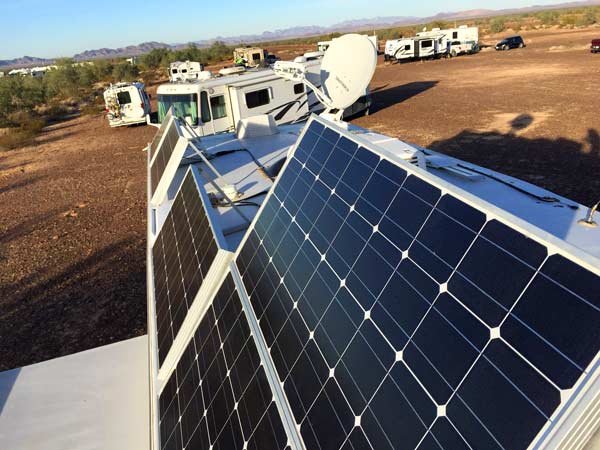
Can I Turn a Wrench?
The more options and mechanical systems a RV has and the older it is, the more things that can potentially go wrong with it. If you lack mechanical aptitude, you’ll want to pay careful attention to the amount of things that can go wrong with your dream rig.
Since even the most expensive buses will have components that break, consider how you will deal with the price of repairs. Those of us with mechanical capabilities are well-equipped to handle these challenges, while the rest of us must pay for help getting through such unexpected events.?
If you purchase a motor home and toad (towed car), you’ll be dealing with two engines as well as house systems (plumbing, electrical, etc.) that may be more complicated than those found in towables. With a travel trailer or fifth wheel, like we have, you have only one engine to maintain.
Money Matters
What Rig Can I Afford?
Financial guru Dave Ramsey says it’s best to purchase depreciating assets with cold, hard cash. He does not recommend getting a mortgage on an RV. We agree, so our recommendation is when it comes to big ticket items like RVs and boats, if you can’t pay cash then stick to units you know you can buy without credit, or at least that you can pay off within 12 to 18 months.
Consider finding a good used RV. Once you narrow down your choices, start talking to others who own those models to see what their average cost of ownership has been through the years.
When we considered buying our fifth wheel, we found other Arctic Fox owners, and learned that all of them were extremely happy with the durability and reliability of the manufacturer.
Buying a new rig will not guarantee that things won’t go wrong, but it sure decreases your odds. And while Dave would disapprove and some people will tell you that only suckers buy an extended warranty to go along with their RV, the $1700 warranty we bought has paid for itself about threefold since we bought our rig, on a handful of very expensive repairs that would have hurt our finances otherwise.
Are You Financially Ready?
We are not retired, nor are we rich wealthy. We just decided to plan accordingly – and take a leap of faith – to support this lifestyle. So far, so good!
For anyone who’s thinking about hitting the road, getting your financial house in order isn’t the most fun thing to dream about, but it’s vital to keep your dream alive.
If you’re not already diligent about budgeting and planning for an ordinary lifestyle, you need to get started. Road tripping will simplify your life but it won’t get rid of financial commitments that need to be managed wherever you live.
Download our free fulltime RVing budget spreadsheet to start planning your own road trip adventure!
With our next post in this series we’ll dive into budgeting for the full-timing experience in much more detail, but for now here are some general areas of consideration:
- Do you know how you will pay for your road trip lifestyle?
Answer this question by thinking about the ways you might support your lifestyle…
Career Considerations
- Can you earn income anywhere with your current career?
- What types of work are you willing to do while on the road?
- Would you consider workamping to save on rent or supplement your income?
- Are you willing to take a pay cut in order to live this lifestyle?
- Do you need to start a new career to become more mobile?
- What about starting a small business?
- If you can see yourself as an entrepreneur, what type of work would make you happiest?
Learn more about how to prepare for Full-time RVing.
These proven tips we’ve included above are but a brief overview of how to prepare for Full-time RVing. We provide complete details and many more helpful tips about transitioning to the nomadic lifestyle from our 15+ years on the road in the Hitting The Road section of our full-time RVing handbook, Income Anywhere!
Other sections cover workamping, making money in the gig economy, and starting your own remote business in great detail.
Stay tuned for the rest of this series here sharing more details about about budgeting and how to support yourself so you can love life on the road.


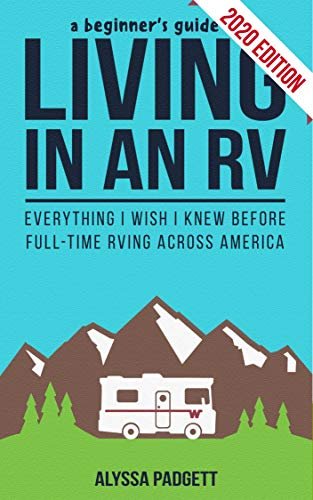





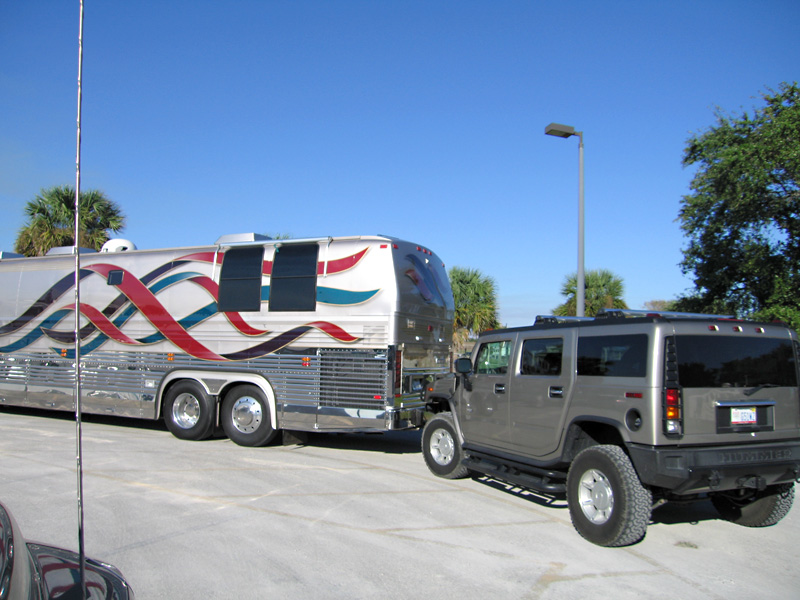


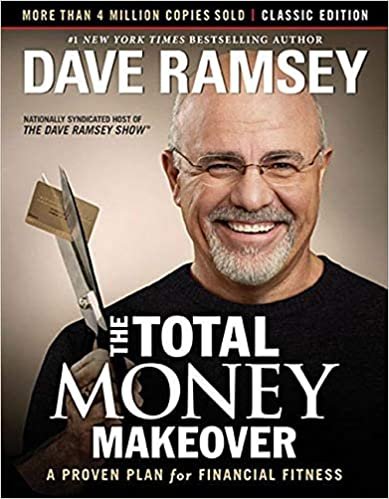
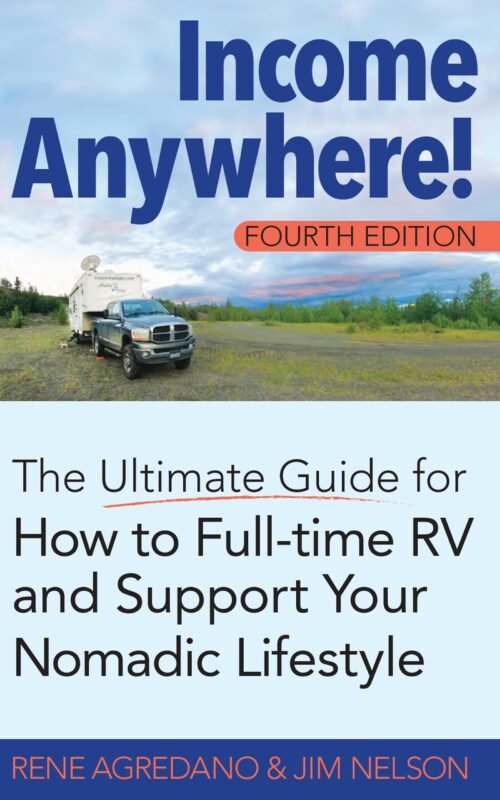
Thank you so much for such a well sourced and informative article(as well as an amazing website).
My wife and I are both 45 and at the point of analyzing and considering how and where we want to spend the next 15+ years of our lives. Living in Montana there is so much to do and the area is so attractive, we are considering augmenting our lifestyle by potentially renting our house out during certain periods and seasons.
Our kids will be off to college in 4-5 years and so it just makes sense to continue our adventure!
I am considering a class b at this point, Unity or Etrek..but have no real clue other than being smitten by glossy brochures and a brief lot visit-yes i know this is a bit premature, but if we’re talking about nurturing our dream board, getting finances in order ect. then I suppose I should be the best prepared as possible.
Anyway, my point is I appreciate your knowledge and sharing of experiences. The links are also awesome, especially for me trying to gather as much as I can.
The only request I have(although I’m sure I will have others) is some clarification on how to budget realistic numbers into a purchase price. In order to try and budget realistically, I can’t for the life of me, figure out what a safe and realistic % off of MSRP is! I’ve seen everything from a 15-30% discount. Is that realistic with these Mercedes Sprinter’s?
Anyway, you have a new reader and I again thank you for your hard work!
John Carnes
John, thank you for your thoughtful comment and suggestions. I say; do it! Get out there on the road and don’t let anything stop you and your wife from living your dream. But I do have one suggestion: when we first started thinking about full-timing, we considered a Class B. At the time we had no idea that our adventure would turn into a lifestyle. Had we purchased a Road Trek or some other small RV like that, Jim and I would have killed each other within months. Granted, our 24′ fifth wheel is by no means large, but I can’t see how we could have survived the trials & tribulations of full-timing in anything smaller. In fact, a RV sales rep once told us “I always have people say they bought too small . . . I never hear anyone say they bought too big!”
When it comes to budgeting for a rig, are you talking about buying new or used?
I have always thought about how life would be if I choose to do RVing for a lifestyle. Based on this post and breakdown I dont know if it would fit the wifey or myself. She loves community and being able to see people on a regular. RV would mean we usually are on the go. I think this is something we could do for a few weeks out of the year but not long term. There are a lot of things that fit for us such as my career being online by nature so moving and traveling is not a problem for me but the wifey would need an office and set location.
Great articles guys, looking forward to the rest of this series. It’s provided a lot of great ideas for my wife and I. We’ve been planning our own escape which will take place in Dec of 2014.
Thanks for the feedback Mike! We look forward to following along on your own journey. Feel free to holler with any questions.